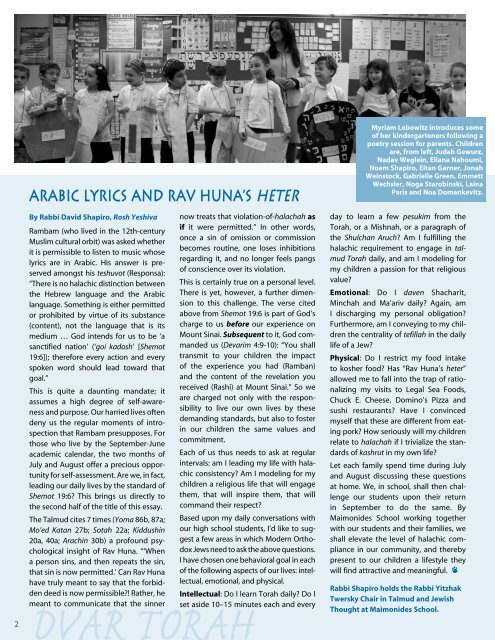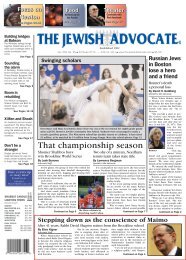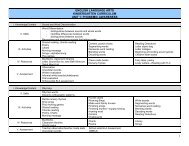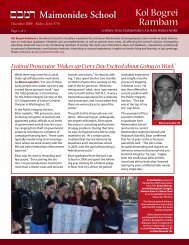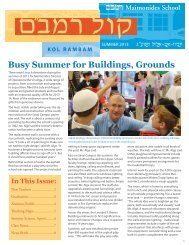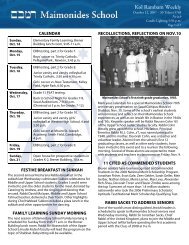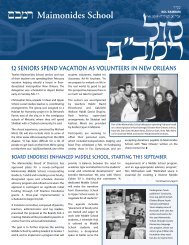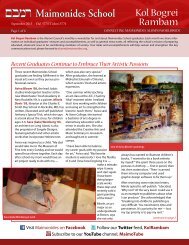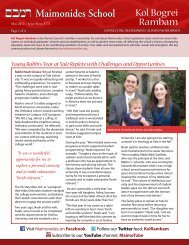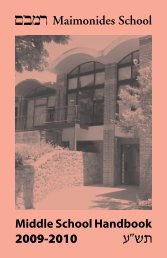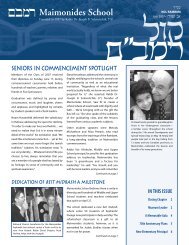ARABIC LYRICS AND RAV HUNA’S HETERBy Rabbi David Shapiro, Rosh YeshivaRambam (who lived in the 12th-centuryMuslim cultural orbit) was asked whetherit is permissible to listen to music whoselyrics are in Arabic. His answer is preservedamongst his teshuvot (Responsa):“There is no halachic distinction betweenthe Hebrew language and the Arabiclanguage. Something is either permittedor prohibited by virtue of its substance(content), not the language that is itsmedium … God intends for us to be ‘asanctified nation’ (‘goi kadosh’ [Shemot19:6]); therefore every action and everyspoken word should lead toward thatgoal.”This is quite a daunting mandate; itassumes a high degree of self-awarenessand purpose. Our harried lives oftendeny us the regular moments of introspectionthat Rambam presupposes. Forthose who live by the September-Juneacademic calendar, the two months ofJuly and August offer a precious opportunityfor self-assessment. Are we, in fact,leading our daily lives by the standard ofShemot 19:6? This brings us directly tothe second half of the title of this essay.now treats that violation-of-halachah asif it were permitted.” In other words,once a sin of omission or commissionbecomes routine, one loses inhibitionsregarding it, and no longer feels pangsof conscience over its violation.This is certainly true on a personal level.There is yet, however, a further dimensionto this challenge. The verse citedabove from Shemot 19:6 is part of God’scharge to us before our experience onMount Sinai. Subsequent to it, God commandedus (Devarim 4:9-10): “You shalltransmit to your children the impactof the experience you had (Ramban)and the content of the revelation youreceived (Rashi) at Mount Sinai.” So weare charged not only with the responsibilityto live our own lives by thesedemanding standards, but also to fosterin our children the same values andcommitment.Each of us thus needs to ask at regularintervals: am I leading my life with halachicconsistency? Am I modeling for mychildren a religious life that will engagethem, that will inspire them, that willcommand their respect?Based upon my daily conversations withour high school students, I’d like to suggesta few areas in which Modern OrthodoxJews need to ask the above questions.I have chosen one behavioral goal in eachof the following aspects of our lives: intellectual,emotional, and physical.The Talmud cites 7 times (Yoma 86b, 87a;Mo’ed Katan 27b; Sotah 22a; Kiddushin20a, 40a; Arachin 30b) a profound psychologicalinsight of Rav Huna. “‘Whena person sins, and then repeats the sin,that sin is now permitted.’ Can Rav Hunahave truly meant to say that the forbiddenDVARdeed is now permissible?! Rather,TORAHhemeant to communicate that the sinnerIntellectual: Do I learn Torah daily? Do Iset aside 10–15 minutes each and everyMyriam Lebowitz introduces someof her kindergarteners following apoetry session for parents. Childrenare, from left, Judah Gewurz,Nadav Weglein, Eliana Nahoumi,Noam Shapiro, Eitan Garner, JonahWeinstock, Gabrielle Green, EmmettWechsler, Noga Starobinski, LainaParis and Noa Domankevitz.day to learn a few pesukim from theTorah, or a Mishnah, or a paragraph ofthe Shulchan Aruch? Am I fulfilling thehalachic requirement to engage in talmudTorah daily, and am I modeling formy children a passion for that religiousvalue?Emotional: Do I daven Shacharit,Minchah and Ma’ariv daily? Again, amI discharging my personal obligation?Furthermore, am I conveying to my childrenthe centrality of tefillah in the dailylife of a Jew?Physical: Do I restrict my food intaketo kosher food? Has “Rav Huna’s heter”allowed me to fall into the trap of rationalizingmy visits to Legal Sea Foods,Chuck E. Cheese, Domino’s Pizza andsushi restaurants? Have I convincedmyself that these are different from eatingpork? How seriously will my childrenrelate to halachah if I trivialize the standardsof kashrut in my own life?Let each family spend time during Julyand August discussing these questionsat home. We, in school, shall then challengeour students upon their returnin September to do the same. By<strong>Maimonides</strong> <strong>School</strong> working togetherwith our students and their families, weshall elevate the level of halachic compliancein our community, and therebypresent to our children a lifestyle theywill find attractive and meaningful.Rabbi Shapiro holds the Rabbi YitzhakTwersky Chair in Talmud and JewishThought at <strong>Maimonides</strong> <strong>School</strong>.
DEJA VU—ANOTHER DANNY BELLIN ’05 GRADUATION SPEECHDanny Bellin delivered the Hebrew valedictory as the top academicstudent of the <strong>Maimonides</strong> Class of 2005. “I thought thatwas pretty cool,” he recalled, adding, “I thought it would be coolto give the university speech, too.”Fast forward a little less than four years, and Danny is on the daisat Boston University’s Nickerson Field, delivering the studentcommencement address. He commended the class of <strong>2009</strong> forits commitments to service, multiculturalism, and social changethat he said earned it the nickname “Generation We.” And healso pointed to challenges that lie ahead.Danny didn’t win this honor by virtue of his high school experience.First he had to be an academic achiever. The universityadministration invited the top 300 or so seniors to submit draftsto a faculty committee. Danny’s entry made the final five, eachof whom delivered his or her address in an auditorium setting.When he was notified of the honor, “I was incredibly surprised. Isaw it as an opportunity to represent my family, my friends andthe Jewish community.”There were some 4,000 undergraduates in the BU Class of<strong>2009</strong>, and about 16,000 guests—faculty members, relativesand friends—packing the university stadium on May 17. “I wasnervous—I didn’t want to mess up in front of all those people,”Danny acknowledged. “But I was excited about the possibilitythat this could really go off well.”By all accounts it did. “It seems like people enjoyed it,” Dannysaid. “It was hard for me to gauge just how many people wereclapping, but afterwards it was really amazing to be recognizedand congratulated by so many strangers. It was almost like beingkind of a rock star. It felt a little weird—in a good way.”The five-minute speech ended up three minutes longer as Dannyslowed his delivery. He pointed out traits that make the currentgeneration distinct—“our optimism, our independence … Wevolunteer more, we are more politically engaged, more open tomore progressive social ideas…” He also noted that “we’re socomfortable using all the new technology that is really connectingeverybody across the world.” Boston University “imbued uswith these qualities” and prepared the class to meet contemporarychallenges, he continued.His face was projected on the giant screens, on which all couldsee that he was wearing a kippah rather than the traditional mortarboard.That, Danny said, reflected “the idea that Jews shouldtake opportunities they have for Kiddush Hashem. It really camefrom the foundation I got at <strong>Maimonides</strong>.”A Trustees Scholar at BU, Danny graduated summa cum laudewith a degree in biomedical engineering. He plans to pursuea doctorate in electrical engineering at Columbia Universitynext year. He has accepted fellowships from the Department ofDefense, the National Science Foundation and Columbia.As an undergraduate, Danny conducted research in the orthopedic,developmental biomechanics and neuromuscular researchlabs, where he studied motor-unit firings that produce musclecontractions. He hopes to continue in a research project that hasan impact on health and medicine.Danny Bellin ’05 speaking at Boston University’sNickerson Field, as displayed on jumbotron screens.See and hear Danny’s address on YouTube.com. Go to channel“MaimoTube” or use the following consecutive links:http://www.youtube.com/watch?v=PQOAYDX8a6Uhttp://www.youtube.com/watch?v=S4vOqptgdS8&feature=relatedMazal tov to…Eleanor (Stern) Weiner ’58 on the engagement of her grandson Tzvi Barkai inYerushalayim.Minna (Brazil) ‘71 and Avi Ringelheim on the birth of their granddaughter, AriellaAliza Rochel Ringelheim.Shani Abelson ’86 and Jerry Schneider on the birth of their son, Hillel Yehuda.Elie ’91 and Jessica Gertel on the bat mitzvah of their daughter Dahlia. Grandparentsare Reva (Levovitz) ’68 and Harvey Gertel.Nechama (Reichert) ‘93 and David Vazana on the birth of their son, Yisrael Moshe.His grandfather is Rabbi Asher Reichert ’67.Shara (Zuckerman) ’91 and Igal Shetrit on the birth of their son, Elisha.Sara (Pollak) ’92 and Benjamin Taragin on the bat mitzvah of their daughter, Elisheva.Ayla and Mechael Osband ’95 on the birth of their son, Afik.Shoshana Eisenberg and Andrew Geller ’96 on their marriage.Estye and Eli Fenton ’96 on the birth of their daughter, Laila Golda.Amy Margulies and Gabe Kahn ’96 on their engagement.Molly and Nahum Palefski ’96 on the birth of their son, Charles Dov.Dr. Ilana (Hefter) Feuerstein ’97 on receiving her doctor of medicine degree fromBoston University.Sharon and Michael Ravid ’97 on the birth of their son, Ethan Jack.Elizabeth Solomont ’97 on her marriage to Philip Levy.Emely and Dr. Daniel Aghion ’99 on the birth of their daughter, Gabriella.Rebecca Israel ’00 and David Sendor ’01 on their marriage.Nessa and Noah Liben ’00 on the birth of their daughter, Ayelet Batya. Noah recentlygraduated from Fordham Law <strong>School</strong>.Ilya Pittel ‘01 on his marriage to Avital Silman.Menachem Wecker ‘01 on his engagement to Jaclyn Schiff.Eva (Fenton) ’02 and Hillel Broder on the birth of their son, Moshe Natan.Ellie Dubitzky ’04 and Jeff Berlin on their marriage.Condolences to…Dr. Elona (Meiselman) Lazaroff ‘56 and Orit Kent ‘89 on the loss of their belovedmother and grandmother, Mrs. Shulamith Meiselman, z”l, sister of Rabbi Dr. Joseph B.Soloveitchik, zt”l.ALUMNIEve (Bulman) Jacobs ’71 on the loss of her beloved husband, Rabbi Jay Jacobs, z”l.Dr. Jeremy Kahan ’83 on the loss of his beloved wife, Amy Kahan, z”l.


